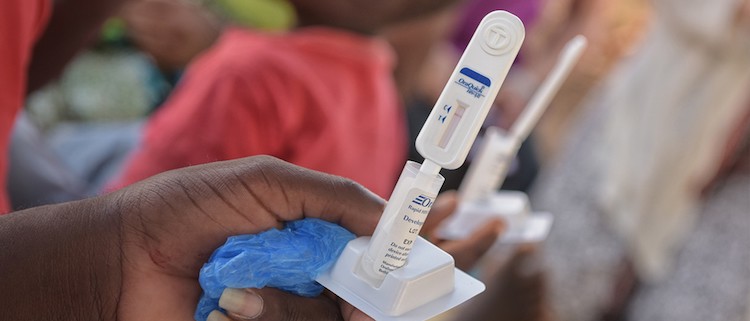
By Kizito Makoye
DAR ES SALAAM, Tanzania (IDN) – Perched on a plastic chair at his shop in the bustling Sinza suburb in Dar es Salaam, Abdul* is anxiously looking at a small kit containing liquid and a stick.
“I want to know my HIV status,” says Abdul while glancing at his watch.
A moment ago, the 28-year-old trader briskly swiped a plastic swab across his upper gum to draw some fluid and slotted it into the kit for testing. After a few minutes, one or two lines would be displayed to confirm the test’s results. (P28) ARABIC | JAPANESE TEXT VERSION PDF | KOREAN
Abdul who sells a wide range of consumer goods, is among thousands of people who had been given free HIV self-test kits as part of the government’s broader push to reach more people with undiagnosed HIV.
According to the Ministry of Health 29,000 HIV self-test kits were distributed in December and 17,000 people are believed to have used them.
The self HIV test kit, which uses an oral sample or blood from a finger prick, is the best way for individuals to examine their HIV status discreetly. The test takes only 20 minutes to confirm the results.
Amid positive signs that Tanzania is embracing the new life-saving technology that could tame the lingering stigma against those afflicted with HIV/AIDS, local residents have expressed optimism describing the new move as a step forward in the fight against HIV/AIDS.
“I’m not ashamed of taking a HIV test, after all I take it myself,” says Abdul
Tanzania President John Magufuli in December signed a new law allowing HIV/AIDS self-testing while lowering the age of HIV testing without parental consent to 15 years.
Ummy Mwalimu, Tanzania’s minister for health said HIV/AIDS self-testing can help people living with HIV to know their status and if necessary receive life-saving treatment and care.
“This move will significantly increase our pace to reach the 90-90-90 goals to end the AIDS epidemic by 2020,” she said.
The 90-90-90 are ambitious treatment targets set by the United Nations to help the end of AIDS epidemic. They aim to ensure that by 2020, 90 percent of all people living with HIV will know their HIV status, 90 percent of all people who know their HIV status will be on antiretroviral therapy and 90 percent of all people receiving antiretroviral therapy will be virally suppressed.
While progress has been made to fight HIV/AIDS in Africa, many people are reluctant to know their HIV status to avoid the stigma associated with the disease.
Self-testing is considered among innovative approaches to diagnosis which can potentially help reach undiagnosed people who are living with HIV, and meet global goals on ending the epidemic.
A core principle of the Sustainable development Goals (SDGs) on HIV/AIDS response is that no one should be left behind. The United Nations works toward achieving ten goals that are particularly relevant to the response to AIDS.
The self-testing initiative has the potential to turn the course of the HIV/AIDS epidemic by increasing the number of people who know their HIV status, said Mwalimu.
About 1.6 million people lived with HIV in Tanzania in 2018. This equates to an estimated HIV prevalence of 4.6%. In the same year, 72,000 people were newly infected with HIV, and 24,000 people died from an AIDS-related illness, according to UNAIDS statistics.
Despite these numbers, Tanzania has in the last decade made a good progress to control the epidemic by scaling-up access to antiretroviral treatment.
“HIV self-testing is a critical entry point to identify and initiate treatment. Studies show that many people in low-income countries don’t know their HIV status. Self-testing kits offer the potential to accelerate treatment and limit transmission,” said Deus Kitapondya, a Public Health specialist at Muhimbili National Hospital.
Africa is shouldering the heaviest burden of HIV/AIDS in the world. In East and Southern Africa Region 800 000 were living with new infections in 2018. An estimated 20.6 million people in that region were living with the virus in 2018.
Concerns about confidentiality and privacy are some of the key barriers to HIV testing services in Tanzania.
“Very few people can willingly go to the HIV testing facility,” says Kitapondya
However, recent data on the use of HIV self-tests show that the availability of simple and discreet way to know one’s status may be one of the keys to dramatically increasing the number of people who take a test.
According to guidelines of the World Health Organisation (WHO) on HIV testing services, countries are advised to conduct pilot programmes on HIV self-testing to collect and synthesize evidence on the role of self-tests in closing the HIV testing gap.
However, Ali Mzige, a public Health expert says self-testing does not by itself provide a complete HIV diagnosis.
“Once a self-test shows positive reaction, the person may be infected with HIV, but we need further tests to confirm the diagnosis and allow him/her to receive treatment and care.”
* The name has been changed to protect the interviewee. [IDN-InDepthNews – 20 January 2020]
Useful links:
HIV and AIDS in Tanzania > https://www.avert.org/professionals/hiv-around-world/sub-saharan-africa/tanzania
HIV and AIDS in East and Southern Africa regional overview > https://www.avert.org/professionals/hiv-around-world/sub-saharan-africa/overview
Photo: Showing a HIV self-test. Credit Zuberi Mussa
IDN is flagship agency of the International Press Syndicate.
facebook.com/IDN.GoingDeeper – twitter.com/InDepthNews











